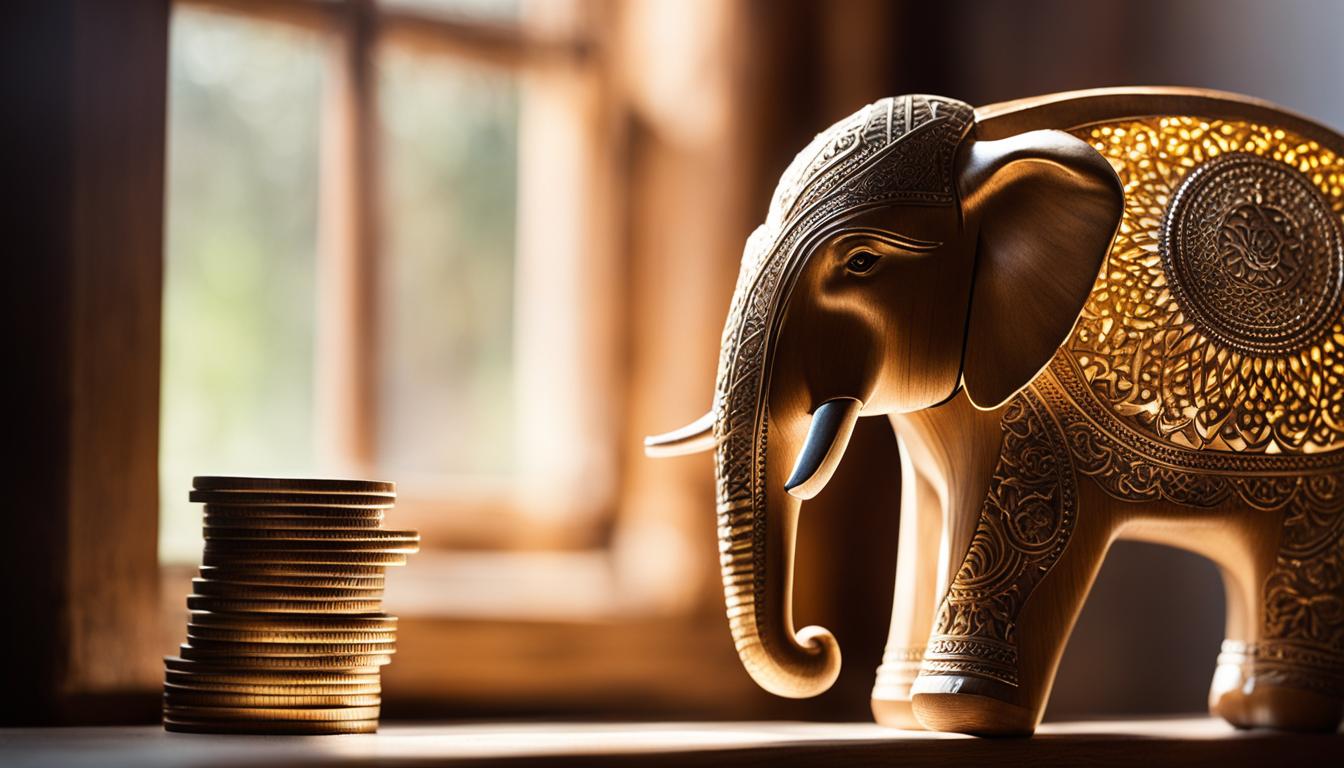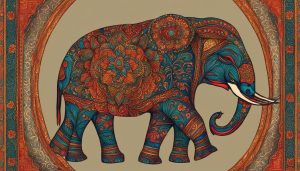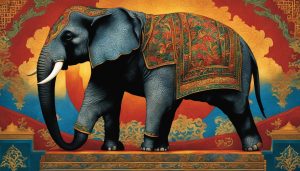Elephants have long been considered symbols of good luck. They represent strength, power, stability, and wisdom. Many cultures believe that gifting an elephant toy can bring good fortune to the recipient. Elephant statues are popular worldwide, and it is believed that they should always face the door to bring luck into the house. Business owners in Asia often place elephant sculptures at the entrance of their buildings to bring stability and wisdom to their companies. In homes, having small elephant sculptures in the entrance hall is believed to bring knowledge, longevity, and success.
Contents [hide]
- 1 The Importance of Elephant Trunk Position
- 2 Sacred Elephants and Their Symbolism
- 3 White Elephants and Their Symbolism
- 4 Elephant Figurines and Their Placement for Good Luck
- 5 Elephant Figurines in Different Cultures
- 6 Conclusion
- 7 FAQ
- 7.1 Does giving an elephant toy mean good luck?
- 7.2 What is the significance of gifting an elephant toy?
- 7.3 What is the importance of the elephant trunk position?
- 7.4 Does the trunk need to be up for good luck?
- 7.5 What is the significance of elephants in Hinduism?
- 7.6 What are white elephants and their symbolism?
- 7.7 How can elephant figurines attract good luck?
- 7.8 Can elephant figurines attract wealth?
- 7.9 What is the cultural significance of elephant figurines?
- 8 Source Links
Key Takeaways:
- Gifting an elephant toy is believed to bring good luck.
- Elephant statues should face the door to bring luck into the house.
- Business owners in Asia place elephant sculptures at the entrance to bring stability and wisdom.
- Small elephant sculptures in the entrance hall of homes can bring knowledge, longevity, and success.
- Elephants represent strength, power, stability, and wisdom.
The Importance of Elephant Trunk Position
When it comes to elephant figurines and their symbolism, the position of the trunk plays a significant role. There is an ongoing debate about whether an upward trunk or a downward trunk brings good luck. Some believe that an elephant with its trunk up showers good fortune on those who pass by, making it a symbol of prosperity. On the other hand, others argue that a downward trunk allows good fortune to flow freely and naturally for everyone, making it a symbol of abundance and generosity.
In many cultures, the common belief is that the trunk must be up for good luck, while a downward trunk is considered unlucky. However, it is important to note that these beliefs can vary depending on individual interpretations and cultural traditions.
Regardless of the position of the trunk, wearing elephant charms or bracelets made from elephant hair is seen as a general symbol of good luck. These accessories are believed to bring protection and blessings to the wearer, attracting positive energy and warding off negative influences.
“Elephant trunks up or down, both carry significance when it comes to symbolism and superstitions surrounding these majestic animals. Whether you prefer an upward trunk or a downward trunk, the important thing is to choose an elephant figurine that resonates with you and brings a sense of joy and positivity into your life.” – Elephant Enthusiast
| Elephant Trunk Position | Symbolism |
|---|---|
| Trunk Up | Prosperity, good fortune |
| Trunk Down | Abundance, generosity |
Ultimately, the symbolism of elephant trunk position is a matter of personal preference and belief. Whether you choose an elephant figurine with its trunk up or down, the important thing is to embrace the positive qualities associated with these magnificent creatures and invite good luck and positive energy into your life.
- Elephants with their trunks up are believed to bring prosperity and good fortune.
- Elephants with their trunks down are associated with abundance and generosity.
- Wearing elephant charms or bracelets is seen as a symbol of good luck and protection.
The Power of Personal Beliefs
It is important to remember that the power of personal belief and intention can greatly influence the impact of elephant figurines on luck and positivity. Ultimately, the position of the trunk is just one aspect of the multifaceted symbolism associated with elephants. By embracing the qualities and symbolism that resonate with you, an elephant figurine can serve as a powerful reminder of the positive energy and good luck that you invite into your life.
Sacred Elephants and Their Symbolism
“Elephants are deeply revered in Hinduism and hold great spiritual significance. They are considered sacred animals and are associated with various deities and beliefs.”
In Hindu mythology, elephants are closely connected to the gods and are regarded as divine beings. One of the most well-known Hindu gods with an elephant head is Ganesh, also known as Lord Ganesha. Ganesh is considered the remover of obstacles and the god of intelligence, knowledge, and prosperity. His elephant head symbolizes wisdom, strength, and intellect. Devotees often offer prayers and seek blessings from Lord Ganesh by presenting elephant figurines or statues.
Another significant figure in Hinduism is Airavata, the sacred white elephant belonging to Indra, the king of gods and the ruler of heaven. Airavata is believed to guard the entrance to Svarga, Indra’s celestial Kingdom. As the carrier of Indra, Airavata plays a vital role in Hindu mythology, controlling rain clouds and symbolizing fertility, abundance, and wealth.
Elephants and Rain
Elephants in Hindu mythology are closely associated with rain and water. They are believed to have the ability to bring forth abundant rainfall, which is essential for agriculture and prosperity. In Hindu rituals and ceremonies, elephants are often bathed and adorned with colorful decorations to symbolize the purification and renewal of life.
Additionally, elephants are also closely linked to the goddess Lakshmi, the Hindu goddess of wealth, prosperity, and fortune. Lakshmi is often depicted sitting on a lotus flower and holding two elephants, symbolizing abundance and fertility. It is believed that having elephant figurines or statues in the home or workplace can attract wealth, luck, and blessings.
| Deity | Symbolism |
|---|---|
| Ganesh | Wisdom, intelligence, prosperity |
| Airavata | Rain, fertility, abundance |
| Lakshmi | Wealth, prosperity, fortune |
White Elephants and Their Symbolism
White elephants hold a special place in symbolism and mythology. In many cultures, they are considered rare and sacred creatures, often associated with wealth, power, and prestige. Thailand, in particular, has a deep-rooted reverence for white elephants, as they are believed to be royal and belong exclusively to the king. Their importance is reflected in Thai culture, with white elephants even appearing on the country’s flag.
While white elephants are seen as symbols of wealth and power, they also come with certain burdens. Maintaining a white elephant can be costly, as they require special care and attention. They cannot be put to work and are solely kept for their symbolic value. This has given rise to the phrase “white elephant,” which is used to describe something that is expensive to maintain or burdensome to possess.
However, it is important to note that the symbolism of white elephants extends beyond their material value. In many cultures, white elephants represent purity, wisdom, and divine qualities. They are seen as divine beings with the ability to bring blessings and prosperity. Their rarity and unique appearance make them objects of fascination and reverence.
| Symbolism of White Elephants | Myth of White Elephants |
|---|---|
| 1. Wealth and power | 1. Royal association |
| 2. Purity and divinity | 2. Sacred and rare |
| 3. Burdensome possession | 3. Expensive to maintain |
As with any symbolic representation, the meaning of white elephants may vary across different cultures. However, the underlying themes of wealth, power, purity, and divine qualities are consistent. Whether cherished as a symbol of prosperity or admired for their rarity, white elephants continue to captivate our imagination and hold a special place in the world of symbolism.
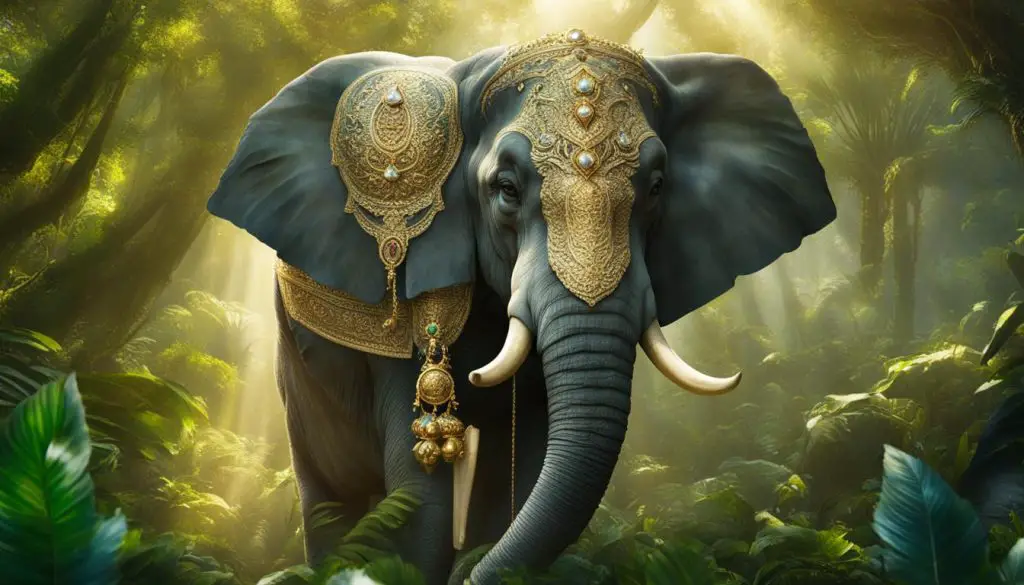
Elephant Figurines and Their Placement for Good Luck
Elephant figurines have long been associated with good luck and positive energy. According to Feng Shui and Vastu Shastra, the placement of these figurines in specific areas of your home or office can enhance their beneficial effects. Let’s explore the different ways you can use elephant figurines to attract good fortune into your life.
Best Placement for Elephant Figurines
When it comes to placing elephant figurines, the front door is considered an auspicious location. By positioning a pair of elephant figurines at the entrance, you can invite luck and protection into your household. The elephants should face the door to symbolize the incoming positive energy. In the bedroom, placing elephant figurines on the nightstand or dresser can strengthen the bond between spouses and promote harmony in relationships. In the office or study room, elephant figurines can help enhance focus and concentration, allowing for greater knowledge and productivity.
The Influence of the Trunk Position
The position of the elephant’s trunk also plays a significant role in its symbolism and effect on luck. According to tradition, an elephant with its trunk raised signifies good fortune and success. This upward trunk is believed to shower blessings upon those in its presence. On the other hand, an elephant with a downward trunk represents the ability to overcome challenges and longevity. Both trunk positions hold positive connotations and can contribute to the overall energy of the space.
When choosing elephant figurines for good luck, consider the material and color as well. Traditional materials include wood, porcelain, or brass. Each material carries its own unique energy and symbolism. Remember to select figurines that resonate with you personally and align with your intentions for attracting good luck and positive energy.
| Placement | Symbolism |
|---|---|
| Front Door | Luck and protection |
| Bedroom | Relationship harmony |
| Office or Study Room | Focus, knowledge, and productivity |
“Elephant figurines have a long-standing association with good luck and positive energy. Placing them strategically in your home or office can help create a harmonious and prosperous environment.” – Feng Shui Master
Remember, the placement of elephant figurines is just one aspect of harnessing their positive energy. Regularly dusting and cleaning them will help maintain their vibrancy and effectiveness. By incorporating elephant figurines into your space and being mindful of their significance, you can invite a sense of luck, stability, and positive energy into your life.
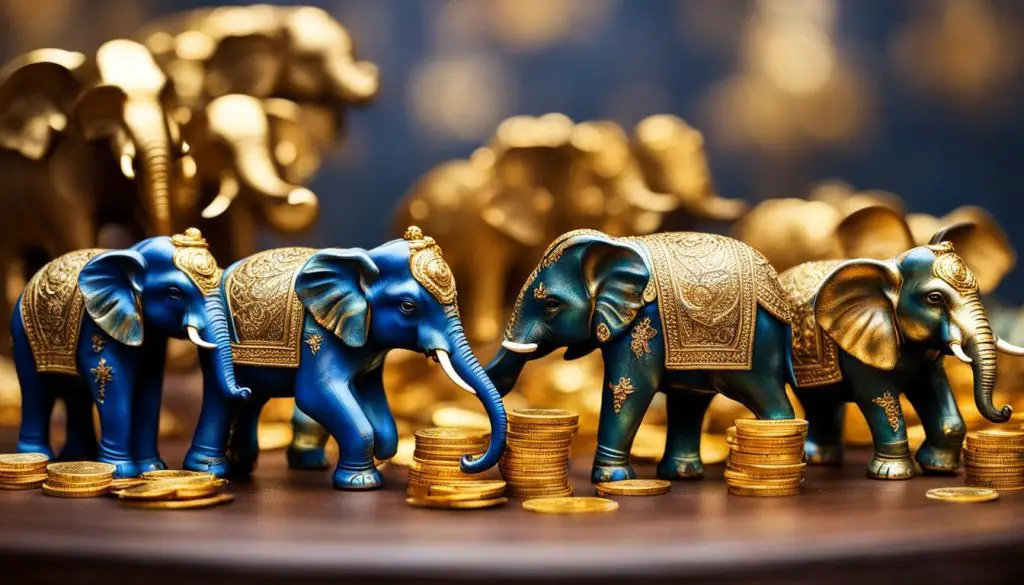
Table: Elephant Figurines Placement for Wealth Attraction
| Placement | Trunk Position | Symbolism |
|---|---|---|
| North corner | Raised trunk | Fortune, success |
| East corner | Raised trunk | Fortune, success |
| Anywhere in the workspace | Raised or downward trunk | Leadership, career growth |
“Placing elephant figurines in your space can attract wealth and prosperity. Choose the trunk position that resonates with you and watch as they bring positive energy and opportunities for success.”
By incorporating elephant figurines into your environment, you can tap into their symbolic power and invite abundance into your life. Whether you believe in the traditional Feng Shui principles or simply appreciate the beauty and meaning behind these figurines, they can serve as powerful reminders of your goals and aspirations. Harness the energy of wealth attraction with elephant figurines and embrace the positive changes they can bring to your life and career.
Elephant Figurines in Different Cultures
Elephant figurines hold deep cultural significance in various societies around the world. From Hindu mythology to Thai culture and Chinese beliefs, these figurines are associated with different meanings and symbolisms.
The Significance of Elephant Figurines in Hinduism
In Hinduism, elephants are considered sacred animals and hold a great deal of importance. They are associated with gods like Ganesh, who represents intelligence, knowledge, and prosperity. Elephant figurines are often used to invoke blessings and bring good fortune in the form of rain, water, and wealth. The goddess Lakshmi, the Hindu goddess of prosperity, is also often depicted with elephants.
The Symbolism of Elephant Figurines in Thai Culture
In Thai culture, white elephants are particularly revered and symbolize wealth and power. These animals are associated with the monarchy and are considered sacred. Elephant figurines are seen as representations of prestige and are believed to bring prosperity and good luck in Thai households. The Thai flag even features a white elephant as a symbol of the nation.
Elephant Figurines in Chinese Culture
In Chinese culture, elephant figurines are believed to bring strength and good fortune. The elephant is seen as a symbol of power and wisdom. It is often associated with important deities and is believed to bring protection and luck to homes and businesses. Elephant figurines are commonly used in Feng Shui practices to attract positive energy and promote prosperity.
By understanding the cultural beliefs and symbolism surrounding elephant figurines, one can appreciate the deeper meaning behind gifting or possessing these beautiful and significant objects. Whether you choose to display an elephant figurine from Hindu mythology, Thai culture, or Chinese beliefs, it can serve as a reminder of the positive qualities associated with these magnificent creatures.
Conclusion
The question of whether giving an elephant toy means good luck has deep cultural roots and can be traced back to ancient beliefs and superstitions. Elephants have long been revered as symbols of strength, power, and wisdom. Gifting an elephant figurine is believed to bring good fortune, protection, and prosperity.
The position of the elephant’s trunk, the material and color of the figurine, and its placement in the home or office all contribute to its symbolism and effect on luck. Regardless of personal beliefs, elephant figurines serve as reminders of the positive qualities associated with these magnificent creatures.
So, whether you choose to give or receive an elephant toy, it can symbolize good luck and positive energy in your life. Embrace the cultural beliefs and symbolism behind these figurines, and let the presence of an elephant toy remind you of the strength, power, and wisdom that you possess.
FAQ
Does giving an elephant toy mean good luck?
Yes, gifting an elephant toy is believed to bring good luck, protection, and prosperity to the recipient.
What is the significance of gifting an elephant toy?
Elephant toys have long been considered symbols of strength, power, stability, and wisdom. They represent positive qualities and are believed to attract good fortune.
What is the importance of the elephant trunk position?
The position of an elephant’s trunk can impact its symbolism and effect on luck. A raised trunk is believed to bring fortune and success, while a downward trunk represents the ability to overcome challenges and longevity.
Does the trunk need to be up for good luck?
The common belief is that an upward trunk showers good fortune on those who pass by. However, some argue that a downward trunk allows good fortune to flow freely and naturally for everyone.
What is the significance of elephants in Hinduism?
In Hinduism, elephants hold great significance and are considered sacred animals. They represent rain, water, wealth, and are associated with gods and goddesses such as Ganesh and Lakshmi.
What are white elephants and their symbolism?
White elephants are considered rare and sacred. They symbolize wealth and power. In Thai culture, they belong exclusively to the king and are associated with prestige. In popular culture, the term “white elephant” refers to something burdensome or expensive to maintain.
How can elephant figurines attract good luck?
Elephant figurines can attract good luck and positive energy into the home. Their placement in specific locations, such as the front door or bedroom, is believed to enhance their beneficial effects.
Can elephant figurines attract wealth?
Yes, placing elephant figurines in the north or east corner of the house or office is considered auspicious for wealth and career growth. The position of the elephant’s trunk can also influence its symbolism in attracting wealth.
What is the cultural significance of elephant figurines?
Elephant figurines hold cultural significance in various societies. They are associated with luck, strength, and positive energy. Different cultures may have varying beliefs and symbolism surrounding elephant figurines.

